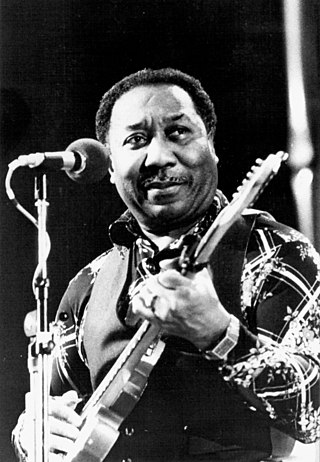
McKinley Morganfield, known professionally as Muddy Waters was an American blues singer, songwriter and musician who was an important figure in the post-World War II blues scene, and is often cited as the "father of modern Chicago blues". His style of playing has been described as "raining down Delta beatitude".
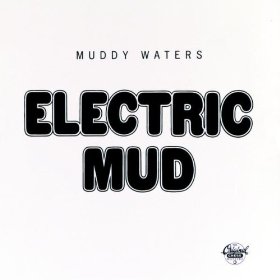
Electric Mud is the fifth studio album by Muddy Waters, with members of Rotary Connection playing as his backing band. Released in 1968, it presents Muddy Waters as a psychedelic musician. Producer Marshall Chess suggested that Muddy Waters record it in an attempt to appeal to a rock audience.

At Newport 1960 is a live album by Muddy Waters recorded during his performance at the Newport Jazz Festival on July 3, 1960. With his longtime backup band, Muddy Waters plays a mix of his older popular tunes and some newer compositions. Chess Records released the album in the United States on November 15, 1960.

Folk Singer is the second studio album and fourth album overall by Muddy Waters, released in January 1964 by Chess Records. The album features Waters on acoustic guitar, backed by Willie Dixon on string bass, Clifton James on drums, and Buddy Guy on acoustic guitar. It is Waters's only all-acoustic album. Numerous reissues of Folk Singer include bonus tracks from two subsequent sessions, in April 1964 and October 1964.

"Rollin' Stone" is a blues song recorded by Muddy Waters in 1950. It is his interpretation of "Catfish Blues", a Delta blues that dates back to 1920s Mississippi. "Still a Fool", recorded by Muddy Waters a year later using the same arrangement and melody, reached number nine on the Billboard R&B chart. "Rollin' Stone" has been recorded by a variety of artists.
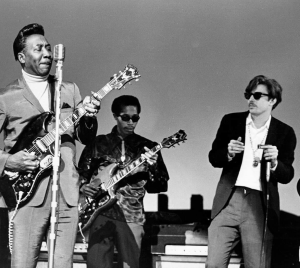
Paul Allan Oscher was an American blues singer, songwriter, and instrumentalist. Primarily a harmonica player, he was the first permanent white member of Muddy Waters' band.

Bob Margolin is an American electric blues guitarist. His nickname is Steady Rollin'.
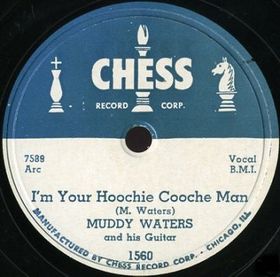
"Hoochie Coochie Man" is a blues standard written by Willie Dixon and first recorded by Muddy Waters in 1954. The song makes reference to hoodoo folk magic elements and makes novel use of a stop-time musical arrangement. It became one of Waters' most popular and identifiable songs and helped secure Dixon's role as Chess Records' chief songwriter.

"Got My Mojo Working" is a blues song written by Preston "Red" Foster and first recorded by R&B singer Ann Cole in 1956. Foster's lyrics describe several amulets or talismans, called mojo, which are associated with hoodoo, an early African-American folk-magic belief system.

Hard Again is a studio album by American blues singer Muddy Waters. Released on January 10, 1977, it was the first of his albums produced by Johnny Winter. Hard Again was Waters's first album on Blue Sky Records after leaving Chess Records and was well received by critics.

The Best of Muddy Waters is a greatest hits album by Muddy Waters released by Chess Records in April 1958. The twelve songs were originally issued as singles between 1948 and 1954 and most appeared in Billboard magazine's top 10 Rhythm & Blues Records charts.

George Carter "Mojo" Buford Jr., was an American blues harmonica player best known for his work in Muddy Waters's band.
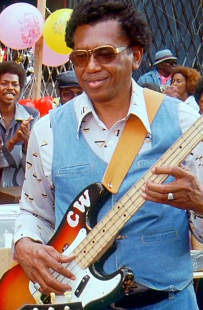
Calvin "Fuzz" Jones was an American electric blues bassist and singer. He worked with many blues musicians, including Muddy Waters, Howlin' Wolf, the Legendary Blues Band, Mississippi Heat, James Cotton, Luther "Guitar Junior" Johnson, Little Walter and Elmore James.

Muddy Waters Sings "Big Bill" is the first studio album, but second overall album by blues musician Muddy Waters, featuring songs by Big Bill Broonzy, released by the Chess label in 1960.

Can't Get No Grindin' is an album by blues musician Muddy Waters released by the Chess label in 1973.

The Muddy Waters Woodstock Album is an album by blues musician Muddy Waters released by the Chess label in 1975. The album features Levon Helm and Garth Hudson from The Band and Paul Butterfield.

Live at Mister Kelly's, often stylized as "Live" , is a live album by blues musician Muddy Waters released by the Chess label in 1971.

The Complete Plantation Recordings, subtitled The Historic 1941-42 Library of Congress Field Recordings, is a compilation album of the blues musician Muddy Waters' first recordings collected by Alan Lomax for the Library of Congress in 1941-42 and released by the Chess label in 1993. Lomax recorded Waters at Stovall Farm in Clarksdale, Mississippi in 1941 and returned the following year to make additional recordings. Thirteen tracks were originally released as Down on Stovall’s Plantation in 1966 on Testament Records.

More Real Folk Blues is an album compiling singles recorded by blues musician Muddy Waters between 1948 and 1953 that was released by the Chess label in 1967.
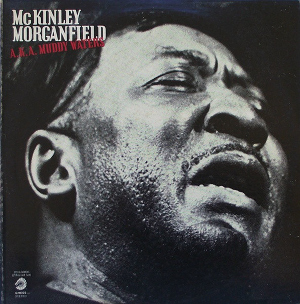
McKinley Morganfield A.K.A. Muddy Waters is a compilation album by blues musician Muddy Waters featuring tracks recorded between 1948 and 1953 released by the Chess label in 1971.




















